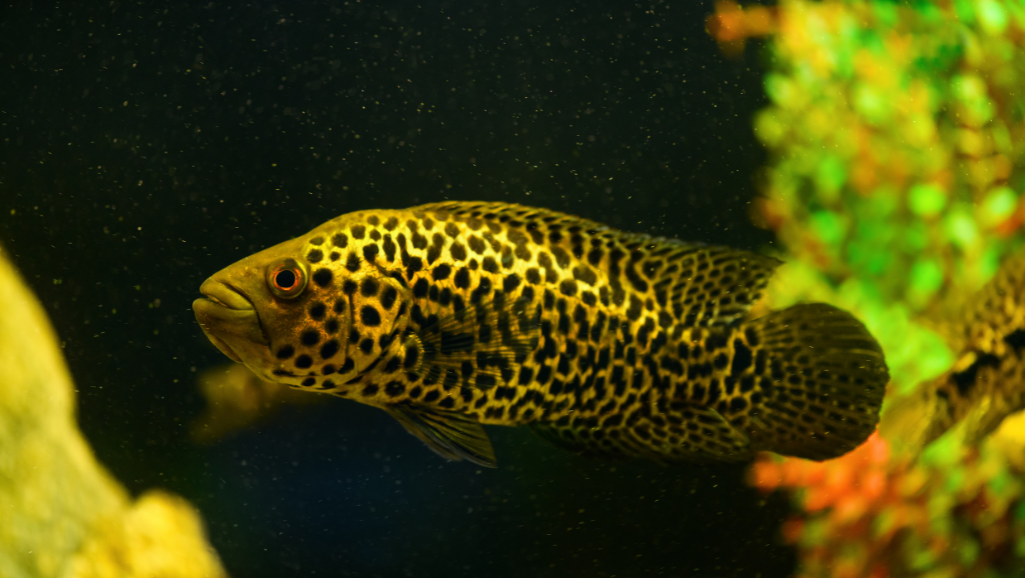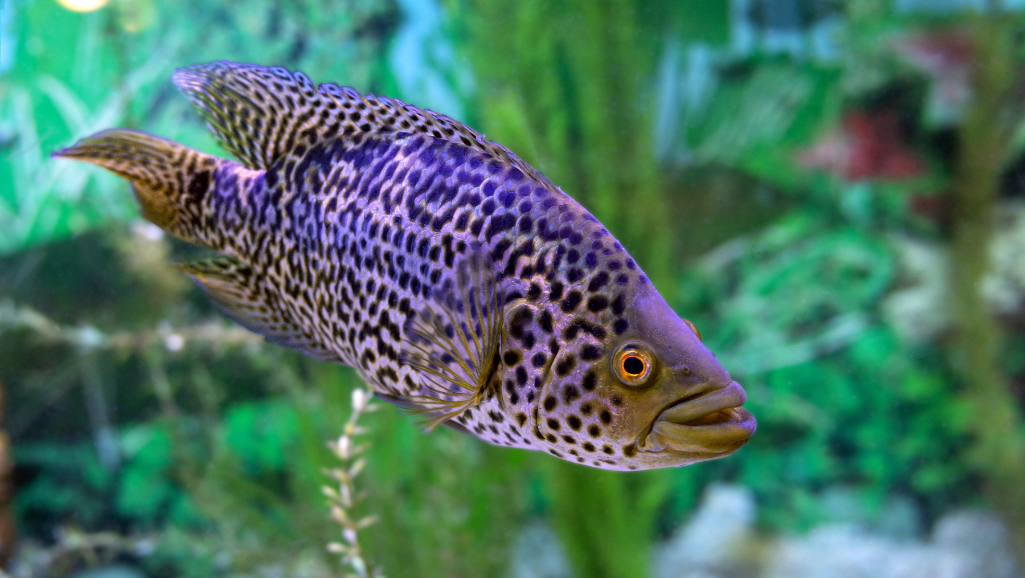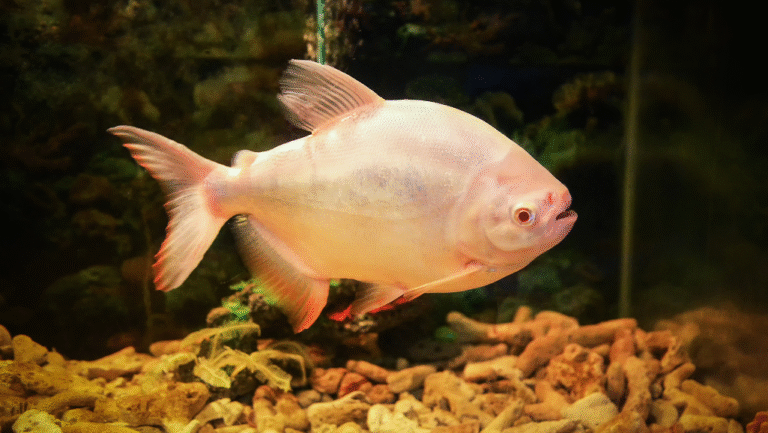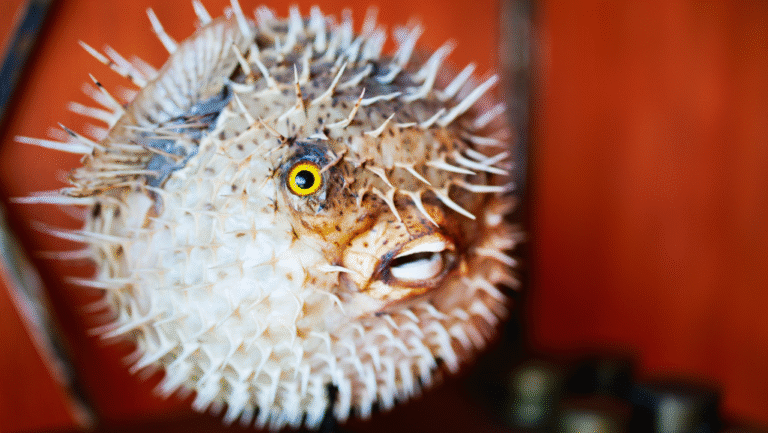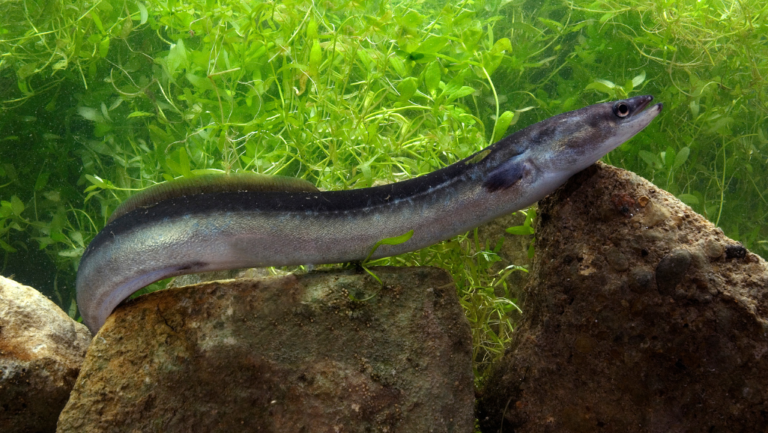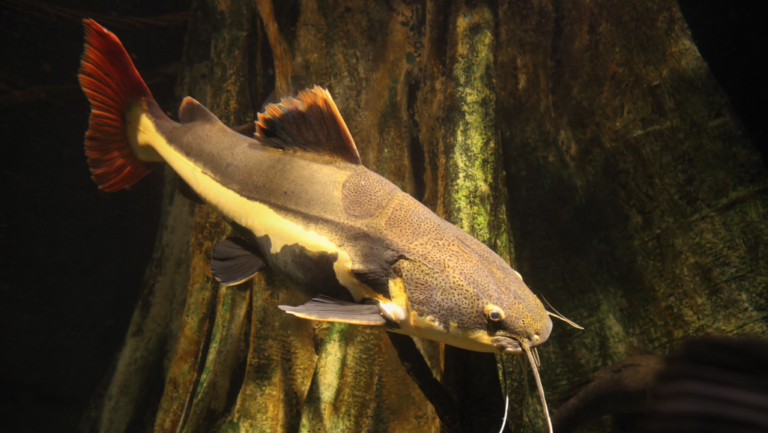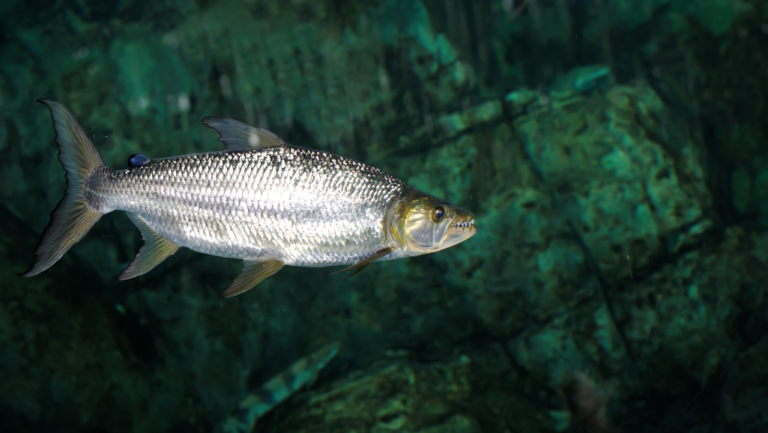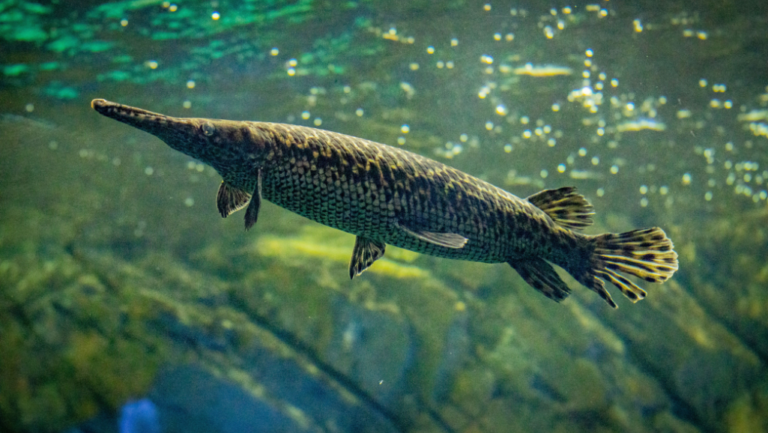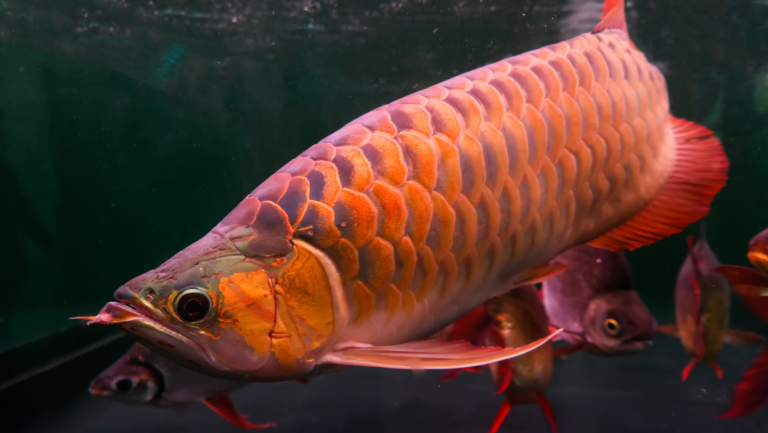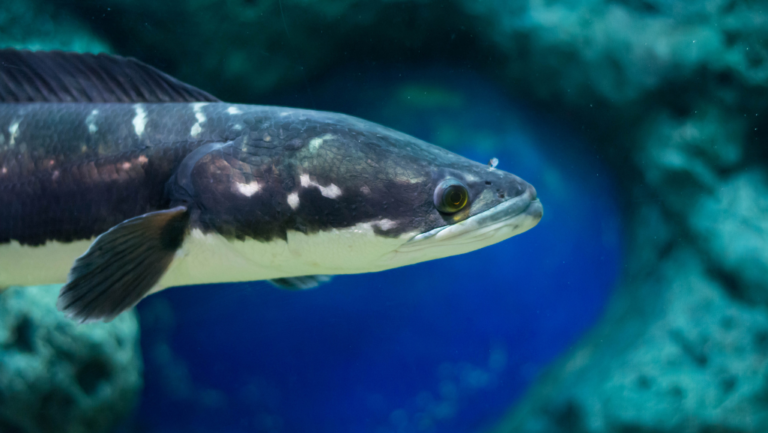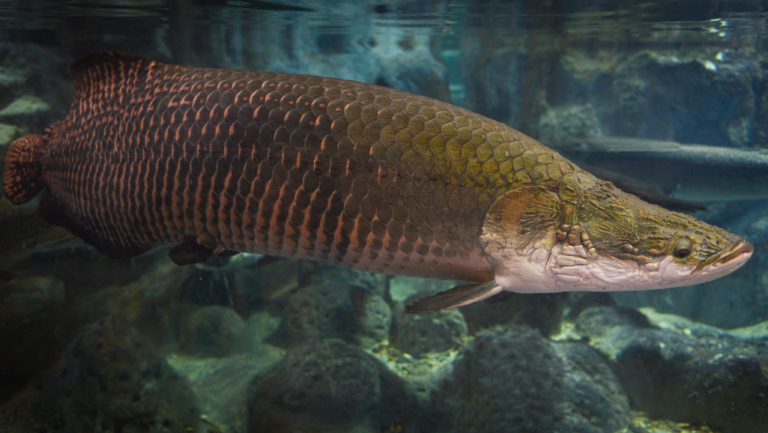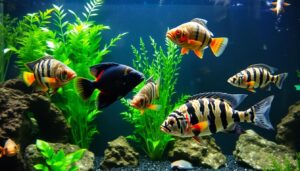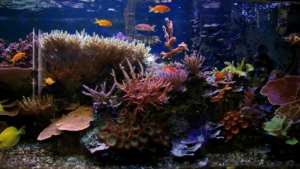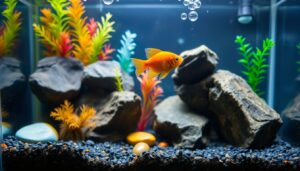Starting your journey in tropical fish keeping introduces you to the Managuense Cichlid. This species, also known as the Jaguar Cichlid, can grow up to 14-16 inches. They have striking black and gold patterns, making them a standout in any tank.
These intelligent fish need a special habitat and diet. They are carnivorous and territorial. With proper care, they can live up to 15 years, making them a long-term commitment.
Taking good care of your Managuense Cichlid ensures their health and happiness. It also adds vibrancy to your tropical fish keeping experience. Let’s explore how to create the perfect environment for them.
Key Takeaways
- Managuense Cichlids, recognized for their dynamic size, necessitate substantial space—a minimum of 75 gallons for an adult specimen.
- Maintaining water temperature between 75°F to 82°F and pH levels from 7.0 to 8.5 mirrors their natural conditions.
- Implementing a powerful filtration system ensures the cleanliness and high water quality required for these robust cichlids.
- To prevent common diseases, regular tank maintenance, including weekly 25% water changes, is imperative.
- Prepare for a lengthy companionship, as Managuense Cichlids can live for around 15 years with proper care.
- Providing an adequate diet of live or frozen foods, alongside high-quality cichlid pellets, is key to their longevity.
- For successful breeding, dedicate a large tank solely to the breeding pair and provide optimal conditions.
Overview of Managuense Cichlid
The Managuense Cichlid, also known as the Guapote Tigre, is a stunning fish species from Central America. It’s loved by many who keep freshwater aquariums. This fish comes from a wide area, from Honduras to Costa Rica.
Origin and Habitat
The Managuense Cichlid lives in murky lakes and rivers, mainly around Lake Managua in Nicaragua. They like the muddy, low-oxygen waters. This makes them great for many aquatic pet setups in freshwater tanks.
Physical Characteristics
This fish has a long body and bright colors that get even more vibrant as it grows. The adult male can be up to 65 centimeters long. He has more color and longer fins than the female, who reaches about 40 centimeters.
Behavior and Temperament
Despite its size and hunting skills, the Managuense Cichlid is not as aggressive as some think. But, it can be territorial and moody, needing enough space. It’s best kept with big, strong fish that can stand up to it. This creates a lively and balanced aquarium for all pets.
Ideal Tank Setup for Managuense Cichlids
Setting up the perfect aquarium for Managuense Cichlids is exciting. It requires understanding their needs to keep them healthy and happy. This task is both fun and rewarding for tropical fish keepers.
Recommended Tank Size
Managuense Cichlids can grow up to 18 inches. They need a lot of space to swim and grow. A 33-gallon tank is good for young ones, but as they get bigger, a 75-gallon tank is better.
A pair of adults needs even more space. A tank of 180 gallons or more is best. This size ensures each fish has enough room without fighting.
Substrate and Decorations
A sandy substrate is best for their digging habits. Decorations should offer hiding spots and help them claim territory. But, avoid too much dense vegetation because they can be destructive.
Adding large rocks and driftwood is good. They look nice and help the cichlids in their tank life.
Filtration and Water Conditions
Good filtration is key for Managuense Cichlids. A strong filter keeps the water clean and full of oxygen. Keep the water temperature between 78°F and 86°F and the pH between 7.0 and 7.4.
These conditions mimic their natural habitat in Central America. Regularly check and maintain water quality to keep them healthy.
Every detail in the aquarium setup matters. It affects the health and growth of Managuense Cichlids. It also makes keeping them a more enjoyable experience. With the right setup, you can enjoy their vibrant beauty and lively activity in your home aquarium.
Feeding and Diet Requirements
Proper nutrition is key for the Managuense Cichlid’s health and energy. These fish thrive in well-kept tanks. Knowing their dietary needs is vital for any fish keeper.
Nutritional Needs
The Managuense Cichlid loves meat, needing a diet full of protein. In the wild, they eat smaller fish and crustaceans. So, their tank food should be similar.
Recommended Foods
Feed them high-quality cichlid pellets for essential nutrients. Live or frozen foods like shrimp and krill are great too. They also enjoy earthworms sometimes. A balanced diet keeps them healthy and colorful.
Feeding Schedule
Adult Managuense Cichlids need food once or twice a day. Make sure they eat it all in five minutes to avoid overfeeding. This prevents water quality problems and keeps them healthy.
Breeding Managuense Cichlids
Breeding Managuense Cichlids, also known as Jaguar Cichlids, needs a deep understanding of their natural behaviors. They have specific needs in captivity. The process from courtship to successful spawning is fascinating but complex.
Creating an optimally prepared aquarium setup is key. Knowing their breeding behavior and caring for the fry is essential. Also, setting up the right tank conditions is vital for a healthy breeding environment.
Mating Behavior
The breeding ritual of Managuense Cichlids is a sight to behold. They show intense color changes and prepare the spawning site carefully. A typical behavior is the cleaning of a flat surface, like a piece of slate or a broad leaf.
After that, the female lays the eggs. The male then fertilizes them in a graceful motion. This process needs a stable and stress-free environment to encourage their natural instincts.
Care for Fry
After spawning, caring for the fry is the top priority. Managuense Cichlids are attentive parents. The fry, up to 3000 from a single spawning, grow quickly.
Both parents help move the fry to safe spots in the aquarium. This helps with oxygenation and protection. For the first few weeks, it’s important to keep the water quality high and feed them fine, nutritious food.
Tank Conditions for Breeding
The best breeding conditions for Managuense Cichlids mimic their natural habitat. They need a water temperature between 75 to 97 degrees Fahrenheit and a pH level from 7.0 to 8.7. This simulates the waters of Central America.
The aquarium should be spacious to accommodate their territorial nature. Adequate hiding spots and areas for territorial claims are essential. Stressed fish often don’t breed successfully.
Health Issues and Prevention
Keeping a Managuense Cichlid healthy means spotting diseases early and knowing how to treat them. It’s key for keeping these colorful fish alive and thriving. Understanding stress signs and prevention is also vital.
Common Diseases
Managuense Cichlids face several health problems, like Ich, which shows as white spots. Fin rot and fungal infections are also common. These can harm their health a lot.
Signs of Stress
Stressed Managuense Cichlids show signs like being very tired or eating less. They might also look very upset. Watching for these signs is important to keep them healthy.
Treatment Options
Acting fast when you see a disease in a Managuense Cichlid is key. For Ich, warm water or copper treatments work well. Keeping sick fish separate helps stop the disease from spreading.
For anyone keeping Cichlids, knowing about health issues and how to prevent them is essential. Regular checks and clean water help keep these fish healthy and colorful.
Compatibility with Other Fish
When setting up an aquarium for Managuense Cichlids, knowing how they get along with other fish is key. The tank’s balance depends on the species, their temperaments, and sizes. This part will guide you on keeping Managuense Cichlids with other fish.
Best Tankmates
Managuense Cichlids can live with fish of similar size and temperament. Good friends include large Central and South American cichlids like Oscars or Flowerhorns. Also, big catfish like Sailfin Plecos work well.
Remember, a big tank is needed for these fish. Tanks of 75 to 150 gallons are often required. But, the benefits of having diverse fish in your tank are worth it.
Aggressive Behaviors
Managuense Cichlids can be quite assertive. This means you need to watch them closely. They might fight over territory, which can happen if the tank is too small or lacks hiding spots.
To keep things peaceful, make sure each fish has enough space. This way, they can all have their own territory in the tank.
How to Manage Mixing Species
When adding a Managuense Cichlid to a tank with others, think about size, temperament, and needs. Too many fish can cause stress and aggression. So, a big tank is important for peace.
Watching how fish interact is also vital. If you see signs of trouble, you might need to change the tank setup or get a bigger one. Adding hiding spots can also help prevent fights, making fish keeping more fun and less stressful.
Maintenance Tips for Managuense Cichlid Tanks
Keeping a freshwater aquarium healthy means paying close attention to its fish. The Managuense or Jaguar Cichlid is known for its bright colors and lively behavior. To keep them thriving, it’s important to follow a good Cichlid care routine.
Water Quality Management
For Cichlid care, it’s vital to keep the water clean. Jaguar Cichlids like water between 75°F to 82°F and a pH of 7.0 to 8.7. Testing the water regularly for ammonia, nitrate, and nitrite is key to avoiding toxins.
Changing about 25% of the water each week is a good rule. This helps keep the water perfect for your fish.
Regular Maintenance Routine
To keep your aquarium like their natural home, you need to clean it regularly. Make sure your filter can handle at least ten times your tank’s volume each hour. This keeps the water clear and clean.
For Jaguar Cichlids, start with a 75-gallon tank for adults. This gives them enough room to swim and behave naturally. Add hiding spots and landmarks to make it feel like their home.
Monitoring Fish Health
Watching your fish closely can help catch health problems early. Look for signs of stress or illness, like odd swimming or changes in eating. Catching these issues early is important for their long life, up to 15 years in captivity.
For more detailed care tips, check out guides like those on Cichlid care specifics.
Conclusion and Final Thoughts
Keeping Managuense Cichlids, also known as Jaguar Guapote, is a rewarding yet challenging hobby. This guide has given you the essential tips to keep these majestic fish healthy and happy. By following our advice, you’ll be well on your way to creating a thriving freshwater aquarium.
Recap of Key Care Tips
Looking after Managuense Cichlids requires careful attention and active participation. They need a large tank to grow, with males reaching up to 16 inches. Keeping the water temperature between 76F to 80F is important for their health.
Feeding them a balanced diet is also key. Tetra Cichlid Sticks and bloodworms are great options. Regular water changes are essential due to their high waste production. Following these tips will help create a thriving environment for your fish.
Encouragement for Responsible Fishkeeping
Being a responsible fishkeeper means a healthier life for your Managuense Cichlids. It also makes your hobby more rewarding. By joining the cichlid care community, you become part of a group that values the complex needs of these fish.
With patience and dedication, you’ll get to see their natural behaviors and interactions. It’s a fascinating experience that enriches your understanding of these interesting creatures.
Additional Resources and Reading
Expanding your knowledge is vital for a successful aquarium. Reading works by Agasen et al. and Bussing can provide valuable insights. Staying updated with studies on cichlid feeding strategies can also help.
Forums and aquatic societies are great resources. They offer wisdom and guidance, helping you provide the best care for your Managuense Cichlid.
